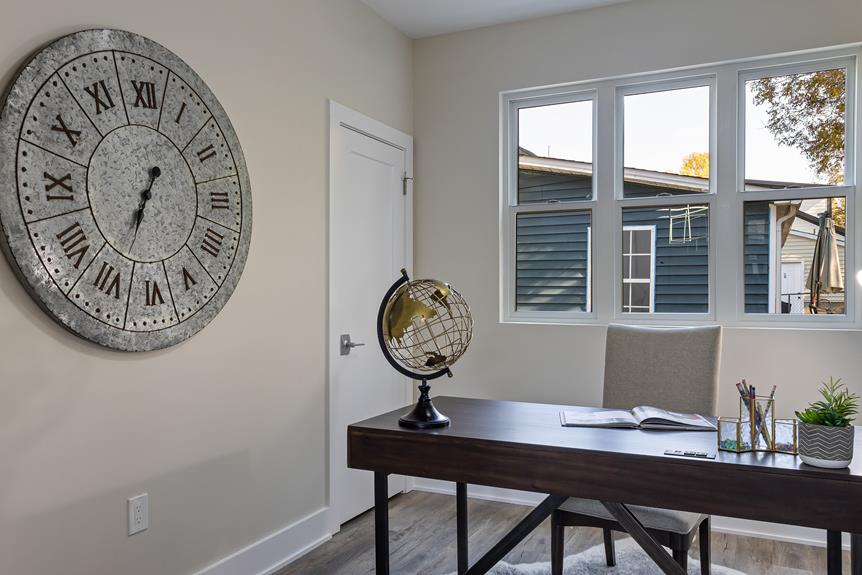Have you ever felt like your home office is an ant magnet, drawing in these pesky critters like a picnic draws in ants? Keeping your workspace free from these unwanted guests requires a strategic approach.
By implementing the right tactics, you can create an ant-free zone where you can focus on your work without any unwelcome interruptions. From identifying common entry points to using natural ant repellents and practicing proper food storage, there are several effective strategies at your disposal.
With a little diligence and know-how, you can keep ants at bay and maintain a productive and pest-free home office environment.
Key Takeaways
- Effective prevention measures for keeping ants out of your home office include sealing cracks and crevices with caulk, applying weather stripping to doors and windows, and keeping the office clean and free of food crumbs.
- Natural ant repellents such as vinegar, citrus peels, cinnamon, and peppermint oil can be used to naturally repel ants. Essential oils like peppermint, tea tree, or lemon can disrupt ants' communication and foraging patterns.
- Proper food storage in airtight containers helps prevent ant infestations, maintains freshness, and organizes food items. It also protects against spills and enhances shelf life, while improper food storage attracts pests and risks contamination.
- Regular cleaning and maintenance, including wiping down surfaces, vacuuming regularly, cleaning up spills, sealing trash cans, addressing moisture accumulation areas, and keeping the office clutter-free, deter ants from invading the workspace. Sealing cracks and gaps in walls, floors, and windows is also important to prevent ant access.
Identifying Common Entry Points
When trying to keep ants out of your home office, start by identifying common entry points through which they can gain access. Understanding ant behavior is crucial in this process.
Ants are incredibly resourceful and can enter through the tiniest of openings, including cracks in walls, gaps around windows and doors, and even through electrical outlets. They leave invisible scent trails to communicate with other ants, making it easier for them to navigate back and forth between their nest and your office.
To effectively prevent their entry, it's essential to create effective barriers. Seal cracks and crevices with caulk, apply weather stripping to doors and windows, and consider using ant repellents around entry points.
Keep your office space clean and free of food crumbs, as this will discourage ants from venturing inside.
Natural Ant Repellents
To naturally repel ants from your home office, consider using common household items such as vinegar, citrus peels, cinnamon, or peppermint oil.
Essential oils like peppermint, tea tree, or lemon are highly effective at deterring ants due to their strong scents that disrupt ants' communication and foraging patterns. You can dilute a few drops of these essential oils in water and spray the solution around entry points, windows, and baseboards. Another option is to soak cotton balls in the oil and place them in areas where ants are commonly seen.
DIY ant traps can also be made using natural ingredients. For example, mix equal parts of sugar and baking soda and place the mixture in small containers near ant trails. The sugar attracts the ants while the baking soda disrupts their digestive system, effectively eliminating them. When using DIY ant traps, ensure they're placed out of reach of children and pets to maintain safety.
In addition to being effective, these natural ant repellents are safer alternatives to chemical-based insecticides, making them a preferable choice for your home office.
Proper Food Storage
Consider using airtight containers to store food in your home office, as it helps prevent ant infestations. Proper food organization and storage are crucial in maintaining a pest-free environment. By keeping your snacks and meals properly sealed, you can effectively deter ants from invading your workspace.
| Benefits of Airtight Containers | Drawbacks of Improper Food Storage |
|---|---|
| Prevents ant infestations | Attracts pests |
| Maintains food freshness | Risk of contamination |
| Organizes food items | Wastes food due to spoilage |
| Protects against spills | Causes unpleasant odors |
| Enhances shelf life | Increases likelihood of mold |
Paying attention to food storage not only aids in pest control but also contributes to a well-organized and efficient home office. Airtight containers not only keep pests at bay but also help in maintaining the freshness and quality of your food. By utilizing proper food storage, you can create a more hygienic and pleasant workspace, ultimately improving your productivity and overall well-being.
Regular Cleaning and Maintenance
For maintaining a pest-free home office, keep in mind the importance of regular cleaning and maintenance to deter ants from invading your workspace. Pest control starts with good hygiene habits. Ants are attracted to crumbs, spills, and other food sources, so wiping down surfaces, vacuuming regularly, and promptly cleaning up any food or drink spills are essential.
Ensure that your trash cans are tightly sealed, and take out the garbage regularly to prevent odors that may attract ants. Pay attention to any areas where moisture accumulates, such as around sinks or windows, as ants are also drawn to water sources. Regularly inspect and seal any cracks or crevices in walls, floors, or windows to block potential entry points for ants.
Additionally, keep your office clutter-free to minimize hiding spots for ants and make it easier to identify and address any potential infestations. By integrating these practices into your cleaning and maintenance routine, you can effectively deter ants and maintain a productive, pest-free home office environment.
Sealing Cracks and Gaps
To prevent ants from accessing your home office, start by sealing any cracks and gaps in walls, floors, and windows. Ants are incredibly skilled at finding even the tiniest entry points, so taking preventative measures to seal off potential access areas is crucial.
Conduct a thorough inspection of your home office to identify any openings that could serve as entry points for ants. Use silicone caulk to seal gaps around windows and doors, and consider adding door sweeps to prevent ants from sneaking in underneath.
For larger gaps in walls or floors, you may need to use expanding foam sealant to effectively block off these entryways. It's also advisable to schedule a professional inspection to ensure that all potential entry points are properly addressed.
Frequently Asked Questions
Will Using Natural Ant Repellents Affect Pets or Children in the Home Office?
Using natural ant repellents can be effective for ant control in your home office. However, it's important to prioritize pet safety by choosing pet-friendly options. Look for child-friendly, natural repellents to keep ants at bay without risking harm to pets or children.
How Often Should I Clean and Maintain My Home Office to Prevent Ant Infestations?
To prevent ant infestations in your home office, establish a regular cleaning schedule and maintain a tidy workspace. Consider natural repellents like essential oils or vinegar. Explore plant-based solutions as an alternative to chemical pest control.
Can Ants Still Find Their Way Into My Home Office Even After Sealing Cracks and Gaps?
Even after sealing cracks and gaps, ants can still find their way into your home office due to their persistent nature. To prevent this, regularly clean and use natural deterrents like vinegar and essential oils.
What Are Some Common Food Items That Attract Ants That I May Not Be Aware Of?
Ant prevention is crucial. Hidden attractants like pet food, crumbs, and even fruit can draw ants into your home office. Keep these items sealed and stored in airtight containers to minimize the risk of an infestation.
Are There Any Specific Types of Plants or Herbs That Can Naturally Repel Ants From Entering My Home Office?
Consider natural deterrents like mint, lavender, and basil for indoor gardening. These plants can be effective in ant prevention. Their fragrances act as a natural barrier, keeping ants out of your home office without harmful chemicals.



